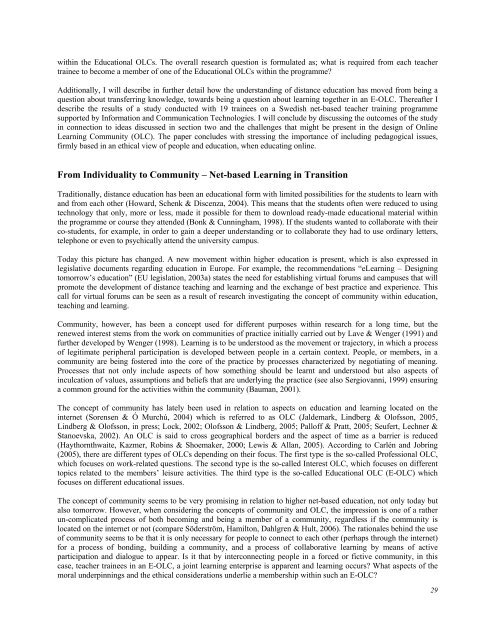October 2007 Volume 10 Number 4 - Educational Technology ...
October 2007 Volume 10 Number 4 - Educational Technology ...
October 2007 Volume 10 Number 4 - Educational Technology ...
You also want an ePaper? Increase the reach of your titles
YUMPU automatically turns print PDFs into web optimized ePapers that Google loves.
within the <strong>Educational</strong> OLCs. The overall research question is formulated as; what is required from each teacher<br />
trainee to become a member of one of the <strong>Educational</strong> OLCs within the programme?<br />
Additionally, I will describe in further detail how the understanding of distance education has moved from being a<br />
question about transferring knowledge, towards being a question about learning together in an E-OLC. Thereafter I<br />
describe the results of a study conducted with 19 trainees on a Swedish net-based teacher training programme<br />
supported by Information and Communication Technologies. I will conclude by discussing the outcomes of the study<br />
in connection to ideas discussed in section two and the challenges that might be present in the design of Online<br />
Learning Community (OLC). The paper concludes with stressing the importance of including pedagogical issues,<br />
firmly based in an ethical view of people and education, when educating online.<br />
From Individuality to Community – Net-based Learning in Transition<br />
Traditionally, distance education has been an educational form with limited possibilities for the students to learn with<br />
and from each other (Howard, Schenk & Discenza, 2004). This means that the students often were reduced to using<br />
technology that only, more or less, made it possible for them to download ready-made educational material within<br />
the programme or course they attended (Bonk & Cunningham, 1998). If the students wanted to collaborate with their<br />
co-students, for example, in order to gain a deeper understanding or to collaborate they had to use ordinary letters,<br />
telephone or even to psychically attend the university campus.<br />
Today this picture has changed. A new movement within higher education is present, which is also expressed in<br />
legislative documents regarding education in Europe. For example, the recommendations “eLearning – Designing<br />
tomorrow’s education” (EU legislation, 2003a) states the need for establishing virtual forums and campuses that will<br />
promote the development of distance teaching and learning and the exchange of best practice and experience. This<br />
call for virtual forums can be seen as a result of research investigating the concept of community within education,<br />
teaching and learning.<br />
Community, however, has been a concept used for different purposes within research for a long time, but the<br />
renewed interest stems from the work on communities of practice initially carried out by Lave & Wenger (1991) and<br />
further developed by Wenger (1998). Learning is to be understood as the movement or trajectory, in which a process<br />
of legitimate peripheral participation is developed between people in a certain context. People, or members, in a<br />
community are being fostered into the core of the practice by processes characterized by negotiating of meaning.<br />
Processes that not only include aspects of how something should be learnt and understood but also aspects of<br />
inculcation of values, assumptions and beliefs that are underlying the practice (see also Sergiovanni, 1999) ensuring<br />
a common ground for the activities within the community (Bauman, 2001).<br />
The concept of community has lately been used in relation to aspects on education and learning located on the<br />
internet (Sorensen & Ó Murchú, 2004) which is referred to as OLC (Jaldemark, Lindberg & Olofsson, 2005,<br />
Lindberg & Olofsson, in press; Lock, 2002; Olofsson & Lindberg, 2005; Palloff & Pratt, 2005; Seufert, Lechner &<br />
Stanoevska, 2002). An OLC is said to cross geographical borders and the aspect of time as a barrier is reduced<br />
(Haythornthwaite, Kazmer, Robins & Shoemaker, 2000; Lewis & Allan, 2005). According to Carlén and Jobring<br />
(2005), there are different types of OLCs depending on their focus. The first type is the so-called Professional OLC,<br />
which focuses on work-related questions. The second type is the so-called Interest OLC, which focuses on different<br />
topics related to the members’ leisure activities. The third type is the so-called <strong>Educational</strong> OLC (E-OLC) which<br />
focuses on different educational issues.<br />
The concept of community seems to be very promising in relation to higher net-based education, not only today but<br />
also tomorrow. However, when considering the concepts of community and OLC, the impression is one of a rather<br />
un-complicated process of both becoming and being a member of a community, regardless if the community is<br />
located on the internet or not (compare Söderström, Hamilton, Dahlgren & Hult, 2006). The rationales behind the use<br />
of community seems to be that it is only necessary for people to connect to each other (perhaps through the internet)<br />
for a process of bonding, building a community, and a process of collaborative learning by means of active<br />
participation and dialogue to appear. Is it that by interconnecting people in a forced or fictive community, in this<br />
case, teacher trainees in an E-OLC, a joint learning enterprise is apparent and learning occurs? What aspects of the<br />
moral underpinnings and the ethical considerations underlie a membership within such an E-OLC?<br />
29

















